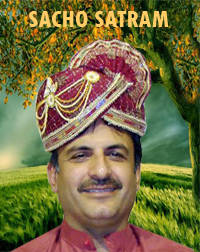
Significance of Chalihya Saheb.
When we come together in a Satsang, our aim is to dedicate ourselves to the divine, to become better individuals, and to evolve into improved versions of ourselves. Each year, in the month leading up to Gurupurnima, we all embark on the Chalihya Sahib journey, a 40-day ritual.
We are incredibly fortunate and blessed to have been born as human beings. Consider this: if we were given four legs instead of two, and resembled any other wandering animal, our existence would be vastly different. It’s a profound realization that we are blessed to be born as humans, and as such, we should strive to become paragons of humanity.
Our defining characteristic should be that of being good human beings, and our identity should revolve around being just that.
A lion that hunts and consumes a human is termed a man-eater, while a human who kills a lion is called a hunter. However, we should aim to transcend such labels and be known primarily as good human beings, characterized by the virtuous values that define our humanity.
When we engage in virtuous deeds, our hearts swell with joy. We proudly display our good actions for all to see, without any fear. We openly declare, ‘I have done this,’ with enthusiasm and sincerity, as we have nothing to hide and nothing to fear from the eyes of others.
Conversely, when we err or engage in wrongful actions, we carry a sense of shame. We conceal our transgressions, avoiding any discussion, for deep within our consciousness, we recognize that we have committed a wrong.
Inhumane actions, actions that defy our core human values, are indeed a stark contrast to the inherent goodness we possess. We are all exceptionally fortunate to have been born into a world filled with blessings. When we pause to recognize and count these blessings, our journey through life becomes a continuous voyage on the ship of happiness. We are endowed with the most precious gift of being a remarkable human body. Alongside it, we possess a brilliant mind, the ability to think, and the capacity to learn – these are all treasures for which we should be eternally grateful.
The act of recognizing our countless blessings and expressing gratitude to a higher power brings us even greater happiness, contentment, and joy in life.
Once , a man arrived in Sainjan’s presence and poured out his heart. ‘Sain, my life is a constant rollercoaster. Sometimes, everything is wonderful, and I’m filled with joy. But when things take a turn for the worse, I’m plunged into stress and despair. During the good times, my work thrives, and I earn respect and admiration from all. My life gleams from every corner. But during the bad times, it’s a nightmare. My existence turns miserable and frightful in every conceivable way. Please, dear Sain, guide me and bless me to experience continuous happiness and joy.’
Sainjan, ever the wise sage, inquired, ‘In which time do you find yourself now, my friend? Is it a good time or a bad time?’
The man replied, ‘Sain ji, it’s a bad time.’
Sainjan, with a reassuring smile, told him not to fret and to follow his guidance.
Sainjan advised the man to begin each day with Naam Dhyan, Simran, and heartfelt expressions of gratitude towards God, thanking Him for even the smallest blessings. After this, the man should go about his regular daily routine. In the evening, upon returning home, he should once again engage in Naam, Dhyan, and Simran (Meditation) for some time and express his gratitude for the day’s experiences, seeking God’s blessings.
Sainjan urged him to adopt this daily practice and, twice a day, to introspect his actions. Regardless of how others behave, the man should steadfastly maintain his goodness and positive intentions towards all. Even if someone wrongs him, he should simply let it go and continue to nurture his inherent goodness. There should be no room in his heart for thoughts of retaliation or revenge. Instead, he should focus on doing good and leaving behind any negativity from the past, embarking on a fresh, virtuous beginning each day.
As per Sainjan’s guidance, the man diligently practiced Naam, Dhyan, and Simran daily. Each day, he initiated and concluded his day with these spiritual practices. Over time, he experienced a remarkable transformation. His emotional and mental strength grew, and the values of gratitude, forgiveness, and goodness became deeply ingrained within him. He blossomed into a joyful, content, and genuinely happy individual.
Regardless of how others behaved, he maintained a positive outlook, remained calm, and consistently exhibited kindness. Days turned into weeks, and he continued to adhere to this path. He had, by now, mastered the art of sustaining a steady, contented life in this manner. After a few months, he returned to Sainjan, expressing his heartfelt gratitude. He conveyed that he had become a happy individual, both at home and in his interactions with others, excelling in all aspects of his life.
Sainjan smiled and imparted a valuable insight. He said that a common mistake many people make is turning to God only when they are in distress. They pray during times of unhappiness or when they face adversity, seeking His help and blessings. However, once God blesses them and life takes a turn for the better, they tend to forget their connection with God. They become proud, claiming they are too busy to spare even five minutes for thanking the very God who has bestowed upon them everything.
In the absence of time for good deeds, they often fill their lives with negative actions. They engage in backbiting, gossip, or indulge in detrimental habits, effectively squandering their time on unfavorable activities. As a result, they drift towards harmful actions, reaping the consequences of these negative deeds. Their balance sheet of goodness and bad deeds becomes disrupted, leading to inner turmoil and a life marked by cycles of sadness and unhappiness.
This cycle of ups and downs can persist indefinitely. However, when you earnestly commit to the daily practice of Naam, Simran, and Dhyan (meditation), you begin to follow the teachings of God. You immerse yourself in His guidance and steadily improve day by day. Happiness and joy become a consistent part of your life. You master the art of enduring happiness and evolve into a genuinely good human being.
This is the true purpose of Chaliya Sahib – not just for a mere forty days each year but for a continuous transformation. It’s about instilling lasting goodness and virtuous values within ourselves, becoming better each day and living by those principles perpetually.
Our faith in God and our confidence in life flourish when we consistently engage in Naam, Dhyan, and Simran. Even during good times, these practices humble our egos, eliminate negative attitudes, and prevent pride from taking root. We remain down-to-earth, ensuring prosperity and steady happiness in our lives.
A person who maintains the practice of Naam, Simran, and Dhyan during good times will always find happiness and good fortune. Each morning, as we awaken, we should commence our day by chanting the sacred name of God, seeking His blessings. This sets the tone for a fulfilling day. In the evening, upon returning, we should express gratitude to our Satguru, and before sleep, thank God. This simple routine brings peace to our minds and happiness to our hearts, allowing us to rest with contentment and tranquility.
When we engage in Naam, Dhyan, and Simran, we shift our focus from judging others to self-reflection. We analyze ourselves, assessing whether we are on the right path or have strayed, identifying areas where we may be lacking or making mistakes. We seek to understand our hindrances and commit to working on them.
We all possess the innate capacity to contribute to humanity and embrace goodness. We should consistently strive in the right direction. We are blessed with the gift of a discerning mind and a compassionate heart to distinguish between what is good and bad for us. After countless cycles of birth and rebirth, we are graced with the human experience. Therefore, we must make the most of it, as humans are the only beings with the cognitive ability to distinguish right from wrong.
Consider this: even someone who may be deemed ‘mad’ still possesses an instinct to discern what is good or bad for themselves. For instance, if you offer a box of stones to such a person and ask them to eat, they would not do so and may react negatively. Conversely, if you offer a box of sweets, they would happily accept it. Even in a state of altered mental faculties, a basic understanding of good and bad persists.
As ‘normal’ individuals, we have the potential to continually better ourselves by seeking God’s blessings and actively working on our character. The true purpose of Chaliya Sahib is to cultivate a lasting commitment to virtuous actions. It signifies that even after Chaliya Sahib concludes, we must persist in doing what is right and righteous throughout our lives. The essence of Chaliya Sahib is to recognize our inherent human values and consistently act in accordance with them.
It guides us toward making informed and virtuous choices. As human beings, we can occasionally lose our way, but the wisdom of Chaliya Sahib serves as a compass, helping us navigate towards a more fulfilling life. This is achievable through our daily commitment to the practices of Naam and Simran. By dedicating time to absorb the teachings of our Satguru and diligently following their guidance, we find ourselves consistently blessed with happiness and joy.



